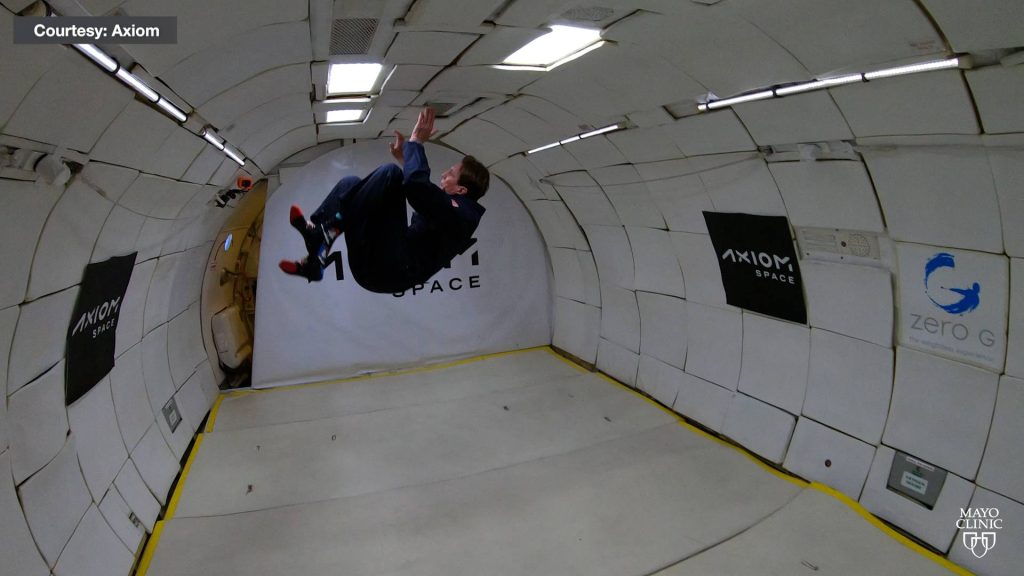
It's a historic mission to space, and Mayo Clinic research will be on board. Larry Connor, a Mayo Clinic benefactor and CEO of The Connor Group, will make history in April 2022 when he pilots the first-ever all-civilian flight to the International Space Station. Connor will take part in some research projects for Mayo Clinic during the 10-day Axiom Space flight.
Watch: Taking Mayo Clinic research beyond the lab and into space.
Journalists: Broadcast-quality video (2:43) is in the downloads at the end of this post. Please "Courtesy: Mayo Clinic News Network." Read the script.
"We will be the first all-private crew that will launch from U.S. soil when we go to the International Space Station," says Connor.
Connor will not only be bringing Mayo Clinic research on board, he also will be one of the civilian astronauts that will be studied by Mayo Clinic scientists and researchers throughout the 10-day mission.
The hope is to spot signs of senescence in the crew, a process where a cell ages and stops dividing, but doesn't die, so it builds up in tissues throughout the body. This research project is being led by Dr. James Kirkland, director of Mayo Clinic's Robert and Arlene Kogod Center on Aging.
"These cells can accumulate with aging in multiple tissues. They tend to be associated with conditions like frailty and multiple diseases, including even diseases in children," says Dr. Kirkland.
Looking for signs of senescence could help in longer-haul trips, such as a mission to Mars.
"The Mars mission may be very difficult to accomplish, unless we can find ways to monitor for senescent cell burden," says Dr. Kirkland.
And based on that, potentially use agents called senolytics, which selectively remove senescent cells.
"What Mr. Connor and the others on the flight have agreed to do is allow us to sample their blood and other fluids to look for markers of senescent cell burden in them before they take off and after they return to Earth," says Dr. Kirkland.
They are taking normal human cells in dishes on the mission to check if these cells become senescent in space.

Also on board the mission will be research from Dr. Andre Terzic that aims to advance knowledge about how to better safeguard the heart for space travel.
"This project will offer insight into heart adaptation during spaceflight through clinical assessment of civilian astronauts and leverage astronaut participation in human stem cell experimentation," explains Dr. Terzic. "Increased understanding of heart innate protective mechanisms could contribute to better understanding of heart health."
For Connor, he sees this mission as an opportunity but also a real responsibility.
"The net result is this will benefit, if done correctly, all mankind," says Connor.
"The goal is to extend health span, the period during life when people live free and independently, and without pain and disability," says Dr. Kirkland.
"What better way could you give back than doing truly inspirational and potentially groundbreaking research at one of the best research centers in the world, which would be right here at Mayo Clinic," says Connor.
For the safety of its patients, staff and visitors, Mayo Clinic has strict masking policies in place. Anyone shown without a mask was either recorded prior to COVID-19 or recorded in a nonpatient care area where social distancing and other safety protocols were followed.







